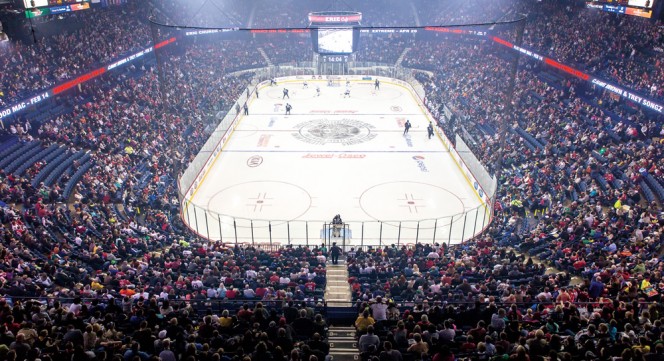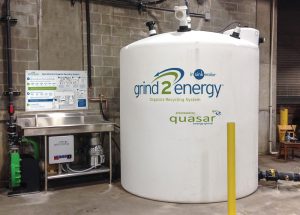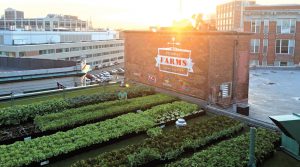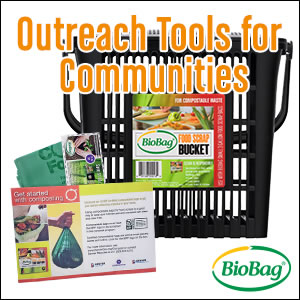Growing numbers of professional sports teams and organizations are capturing edible food in their venues for donation, while continuing to divert food scraps to composting programs.
Marsha W. Johnston
BioCycle June 2015

Allstate Arena is advancing organics diversion, recycling and energy efficiency. Photo by Edward Marshall, Allstate Arena
From Toronto to San Diego, leagues, teams, sporting event organizers and their partners are adopting surprising innovations to reduce food waste, ensure that untouched food feeds someone’s hunger, and divert the rest away from landfills. A few are even closing the food life cycle loop by adding on-site gardens.
“Since 2010, we’ve seen a reduction in food waste,” says Paul LaCaruba, Manager Of Public Affairs for the National Hockey League (NHL), which was the first professional sports league to mandate food donation at all 30 of its franchises. “The U.S. EPA collects numbers for the Food Recovery Challenge and is looking to measure the percentage increase in food donated, but I think what we’re seeing is that clubs are creating less waste.”
Indeed, says Bryan Leslie, Director of the Toronto Maple Leafs’ Building Operations and Team Up Green. “Talking only about diversion doesn’t tell the whole story. Before we started anything, we did a benchmark analysis of tonnage collected. The first part of the process was to reduce the amount collected [for disposal], so we did things like reuse cardboard boxes. After that, we tried to divert as much as we could.” Since 2007, the Maple Leafs have reduced landfilled waste by 74 percent, and average a 60 percent monthly diversion rate.
The Green Sports Alliance (GSA), founded in 2010 by the Natural Resources Defense Council (NRDC) and Vulcan Sports and Entertainment (a division of Paul G. Allen’s Vulcan Inc. that owns the Seattle Seahawks, Seattle Sounders, and Portland Trail Blazers), encourages and tracks reductions in food waste and wasted food. GSA’s mission statement is “to help enhance the environmental performance of sports teams, venues and leagues.” Its programs cover renewable energy, healthy food, recycling, water efficiency, species preservation, safer chemicals and other environmentally preferable practices.
Food Donation
The GSA will release a new report on food waste initiatives at its annual Green Sports Summit, June 29-July 1, 2015 in Chicago. Authored principally by Alice Henly, Green Sports Alliance Director of Programs, and Darby Hoover, Senior Resource Specialist at NRDC, it looks at the life cycle of food as it relates to sports venues — from menu design and portion control to procurement and sourcing, improving kitchen efficiency, packaging and serving choices, food recovery, donation, food waste processing and composting. “There has been a long-standing proliferation of food donations,” says Henly. In addition to all NHL franchises, “at least half of NBA [National Basketball Association] basketball arenas and many, many NFL [National Football League] and baseball venues are donating prepared, untouched food,” she adds. “It is a very high percentage.”
Since food donation nonprofit Rock and Wrap It Up launched Sports Wrap! in May 2003, the program has grown to service 75 franchises in the NFL, NBA, NHL, MLB (Major League Baseball), and MLS (Major League Soccer), feeding thousands of people each week. “Our goal is to get this conversation going in America and to use sports as the guiding light,” says Rock and Wrap It Up! (RWU) founder Syd Mandelbaum, who will present statistics on its work at the Green Sports Summit.
Sports Wrap! began at the initiative of Brooke Maroth, wife of Detroit Tigers pitcher Mike Maroth. She read about RWU volunteers collecting leftover food backstage after rock concerts and asked Mandelbaum if RWU could do the same at the Detroit Tigers Clubhouse. After honoring the Maroths with the RWU Bill Emerson Good Samaritan Award in 2004, word spread quickly, recalls Mandelbaum. In New York, the program began with the NY Giants in April 2005. “We had every New York area team’s concessions within 18 months,” he says.
RWU was already serving a few NHL clubs when NHL Commissioner Gary Bettman drove the league-wide decision to mandate food donation. “He could not have been more enthusiastic,” Mandelbaum explains. “He wanted to be the green league because so many of the players are from small towns and started by playing outdoors on ponds, so Gary made the commitment to make it happen.”
As a result, NHL and other franchises have become indispensable to local food donation operations. The Edmonton Oilers (Alberta, Canada), for instance, working with RWU, volunteer organization Northlands and Dominion Sports Service, have donated a total of 30,654 pounds of prepared but unserved food from Oilers, Oil Kings games, and other events at Rexall Place, providing 23,600 meals to shelters and soup kitchens via the Edmonton Food Bank. “We’ve become such a throwaway society, a lot of times people think you can’t reuse or repurpose food,” says Natalie Minckler, Executive Director of the Edmonton Oilers Community Foundation, which manages the program. “But it’s so important to people in our community to get access to this food, which is very high quality — not your typical can of tuna or peanut butter.”
On-Site Organics Management
Henly says implementation of composting operations — both back and front of the house — is growing rapidly. “It typically includes landscaping debris from gardens around the venue,” she explains, adding that the majority of organics are diverted off-site, “as it’s rare to find the space to have full composting facilities at pro sports facilities. But a few are doing it on-site. It’s more common near collegiate athletic facilities.”
Last fall, MetLife Stadium in East Rutherford, New Jersey, the 80,000-seat home of the New York Jets and Giants, implemented composting on site. MetLife Stadium procured an AGF Brome In-Vessel Rotary Composter and Patz mixing unit from Montreal-based Group Commercial Paul Larouche. The equipment was first placed near a loading dock, then moved to a roomier, more central location at the 750-acre sports complex. After stadium events, workers throw all food and compostable service ware into the vessel and add carbon-rich material such as cardboard and paper. After about eight weeks in the composter, the processed material is ready to be used as mulch at the facility. Anticipated savings are between $20,000 and $25,000 annually. “When you give your material to a recycler, you rely on them to do the right thing,” notes David Duernberger, the vice president for facility operations at MetLife Stadium. “With us, we have complete control over the process.”
Several sports venues have installed grinding systems on site to manage food waste.

A Grind-2-Energy system is installed at the Cleveland Indian’s Progressive Field in Cleveland, Ohio to process food scraps into a slurry, which are hauled to an anaerobic digester. Photo courtesy of InSinkErator
InSinkErator, owned by Emerson Electric, launched Grind2Energy several years ago to provide a full-service turnkey business whereby it designs, installs and maintains equipment that grinds food waste, which is pumped as a slurry to an on-site storage tank. A liquid waste hauler picks up the slurry and delivers it to an anaerobic digestion facility. “We offer the customer a turnkey model for a monthly service fee,” says Matt Whitener, Vice President of InSinkErator Commercial, who manages the Grind2Energy initiative. “We contract with the liquid waste hauler and disposal facility, and the customer’s responsibility is to feed the processing equipment with food scraps.” The system, which represents four years of R&D, is in operation at the Cleveland Indians’ Progressive Field, Cleveland Browns’ First Energy stadium and Ohio State’s Schottenstein Center. Whitener says InSinkErator has had inquiries from other sporting venues, and will be gradually rolling the system and service out, particularly in regions where tipping fees and regulatory regimes are favorable to food waste diversion, such as the Northeast and California.
The Dallas Cowboys and Toronto Maple Leafs have both recently installed the Organic Refuse Conversion Alternative (ORCA) system from Toronto-based Totally Green Inc. Using a proprietary microorganism solution, stainless steel tines and recycled plastic “Bio Chips,” the ORCA pulps organic food waste into an effluent that is discharged into the municipal wastewater system in 24 hours. The ORCA will digest up to 2,400 pounds/day of food waste, according to the manufacturer.
“There are a few things the enzymes don’t like, such as coffee grounds, so those go to compost,” says Leslie of the Maple Leafs, which installed three ORCA units. “We did some pretty significant testing with the city.” The three machines are saving the Centre approximately $223,000 annually in labor costs and organic waste disposal fees, he adds. “Between hockey and basketball games, concerts, and our office operations, we had 8 trucks per week of organic waste being collected.”
Another on-site trend at sports venues is growing fruits and vegetables. Henly estimates that approximately a dozen venues have installed organic gardens or farms to grow fruits and vegetables for use in foodservice operations, as well as for donation in their communities. The on-site gardens can generate enough food to offset some produce purchases. And when compost generated from a stadium’s food waste is used as fertilizer, the gardens can serve as an educational tool on closed-loop food systems.
Two of the newest installations are the 5,000-square-foot rooftop Fenway Farms at the Boston Red Sox’s legendary ballpark (see sidebar), and the San Jose Earthquakes’ edible garden inside its Avaya Stadium that will include fruit trees. On-site baseball park gardens have already been established by the San Diego Padres, Colorado Rockies and San Francisco Giants.
Diversion At Individual Events
The ability to divert food waste from individual annual sporting events to composting facilities is limited by the composting and waste management services available in the region where the events are held. “You can sometimes arrange a one-off contract to haul to a composter, and it is happening, but it just depends on the circumstances,” says Henly, adding that sponsors are a big piece of the equation in financing this type of program, providing direct or in-kind support.
Abbie Beane, Director of Sustainability programs for The Offset Project, an environmental nonprofit based in Monterey, California, agrees that sponsors are critical for the events it manages, which include the AT&T National Pebble Beach Pro Am and Shell Houston Open, both Professional Golfing Association events. Venue commitment to zero waste is also key. Beane notes that Pebble Beach Resort’s determination to be a zero waste event has generated great improvement in its food waste management.
“One of the best changes that occurred last year at Pebble Beach was getting rid of ketchup, mustard and relish packets,” she explains. “We do a lot of hand sorting and it was taking hours to pull these items out. We just kept telling them, it doesn’t send a very good message if you’re trying to be zero waste, and you have a single-use, disposable item.” Condiment pumps take more time and labor to keep them looking clean during the event, but for large events, save about 25 percent over buying condiment ketchup packets. “Most of the savings can be attributed to hiring less labor for picking litter off the course,” says Beane, adding that it also reduces the chance of litter blowing into the ocean.
Marsha Johnston, principal of Earth Steward Associates, is a Contributing Editor to BioCycle.















